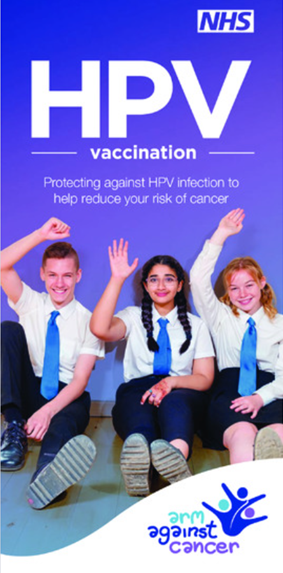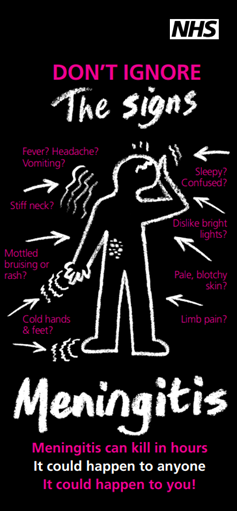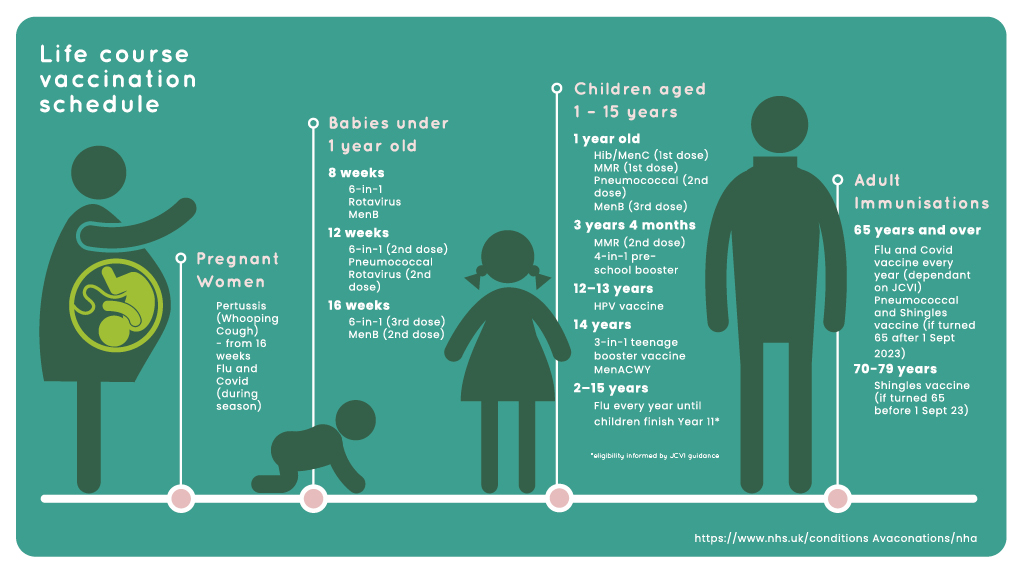Teenage Vaccinations - Essential Information
Secondary school children (age 11 to 16) are offered vaccinations to protect them against:
- Human Papillomavirus (HPV) in year 8.
- Tetanus, diphtheria and polio (DTP) (3 in 1 teenage booster) and Meningitis ACWY in year 9.
- In some areas, children are also offered the flu vaccine.
Human Papillomavirus (HPV)
The HPV vaccination will be offered to boys and girls in year 8 of secondary school (12 to 13 years) by the school nursing team. Consent from parents or carers is needed for children to receive their vaccination. How to do this will be communicated by the school. The HPV vaccine:
- Reduces the chance of catching the HPV virus, this is a common virus spread from skin contact (usually sexual contact)
- Reduces the risk of certain cancer including cervical cancer, mouth cancer, anal cancer, penile cancer, and vaginal cancer.
- Reduces the risk of genital warts.
Find out more about the HPV vaccine on the NHS website.
 The HPV for all leaflet provides essential information so parents and carers can give informed consent for their children to have their HPV vaccination. The leaflet is also available in 33 languages.
The HPV for all leaflet provides essential information so parents and carers can give informed consent for their children to have their HPV vaccination. The leaflet is also available in 33 languages.
3 in 1 teenage booster (DTP)
This helps to protect from tetanus, diphtheria and polio. It is given to children in year 9 (age 13 or 14) by the school immunisation team.
- Tetanus is a life threatening condition caused by bacteria getting into a wound, such as a bite, burn or scratch.
- Diphtheria is an infection that affects the nose and throat and sometimes the skin. It is rare in the UK due to vaccination but there is a higher risk if you are traveling to a part of the world where there is more risk.
- Polio is a virus that can affect the brain and nerves causing paralysis in the legs. It is extremely rare in the UK because of vaccination. Vaccination is required to travel to certain countries.
The teenage booster is given as a combined vaccination in one injection in the upper arm. Children will have received these vaccinations when they were infants as part of the immunisation schedule, this additional dose will boost their immunity and protection as this decreases over time.
Find out more about the 3 in 1 teenage booster on the NHS website.
Meningitis ACWY
 The meningitis ACWY vaccination helps to protect against 4 types of bacteria linked to meningitis (meningococcal bacteria A, C, W and Y) as well as septicaemia (blood poisoning). It is offered to all children in year 9 at the same time as they are given their 3 in 1 teenage booster. The vaccination is effective but does not prevent all types of meningitis, so it is important to be aware of the symptoms even after being vaccinated.
The meningitis ACWY vaccination helps to protect against 4 types of bacteria linked to meningitis (meningococcal bacteria A, C, W and Y) as well as septicaemia (blood poisoning). It is offered to all children in year 9 at the same time as they are given their 3 in 1 teenage booster. The vaccination is effective but does not prevent all types of meningitis, so it is important to be aware of the symptoms even after being vaccinated.
Meningitis spreads very quickly in places such as colleges and universities due to staying in confined spaces and sharing of facilities. It is important to have this vaccination whilst in school to ensure ongoing protection.
Find out more about Meningitis ACWY:
Who should have these vaccines?
 Schools will let parents and carers know when these vaccines are needed according to the immunisation schedule.
Schools will let parents and carers know when these vaccines are needed according to the immunisation schedule.
If any of these vaccinations have been missed during the scheduled school visit there is the option to catch up. Contact your school nursing team to ask about community catch up clinics if you are still in secondary education. Contact your GP surgery if you have left school to find out how to get vaccinated.
Once you turn 16 you can consent for your own vaccinations.
You only cannot have the vaccine if you have had a serious allergic reaction to a previous dose or are allergic to any of the ingredients in the vaccine. You will need to discuss this with the school nurse or the GP.
All vaccines are provided free of charge by the NHS.
Please see below for a video on vaccines for young people. Q&A with NHS Scotland vaccinator and secondary school pupils.



